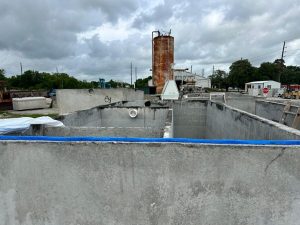Europump Guidance on New China Compulsory Certification for Ex Products
So, with a 12-month transition period in place from that date, the new regulations for Ex product certification and marking will formally come into effect on 1st October this year.
To help ensure that pump manufacturers across Europe are prepared and ready for this rule change, Frank Ennenbach, Chairman of the Standards Commission within Europump is keen to offer this core guidance.
Basic rules
The basic principles of the new certification rules are contained in the regulation CNCA-C23-01:2019 - Mandatory certification rules - Explosion-proof electrical equipment (also called CCC Ex). This regulation requires that all Ex products listed in the product catalogue must undergo the following three-step CCC certification process, regardless of the manufacturing location:
- type testing (Ex product evaluation, testing and certification)
- initial inspection at the production site
- monitoring and re-certification audit at the manufacturing site
Scope of application
This new regulation applies to all products listed in the existing NPLS catalogue, although some products, such as Ex-lights, are not included in this catalogue and are therefore (for the time being at least) excluded from this new regulation.
For manufacturers wishing to place Ex-products on the Chinese market, it is first important to find out whether the products fall under the CCC certification obligation. Currently there is a list of 17 product categories that can serve as a guide. All products that are subject to CCC certification can be identified in the CCC catalogue by their customs tariff number (Chinese HS code).
Full details on all the products that fall within scope of the regulations, as well as the ex-classification under the new Factory Definition Codes (FDC’s) can be found via several resources including info@cnex-ccc.com, an authorised independent CCC Ex-product certification body and test laboratory.
Conversion of existing Chinese Ex certificates to CCC-Ex
Conversion of an existing Chinese Ex-certificate to a CCC Ex-certificate must be undertaken by the same inspection body that issued the original certificate, although for the conversion to be carried out the following documents will be required if they are not already available to the inspection body:
- Application form, e.g. online at the inspection body
- Registration licence of the applicant, the manufacturer, the manufacturing site(s) (e.g. business licence, organisation code certificate, etc.)
- Agreement between the applicant, the manufacturer and the manufacturing site(s)
- Original certificate
- Information on product labelling (e.g. CCC logo, FDC code, warnings in Chinese etc.)
- Product photos
CCC-Ex application based on other existing certification
IECEx CoC can serve as the basis for a CCC Ex-certificate application, but a wide range of documents will be required, if they are not already available to the testing laboratory. Alternatively, a direct application for CCC Ex-certification can be undertaken, but of course this would require the provision of even more product information, technical data and supporting documentation.
Quality control monitoring
Previously, manufacturers who sold Ex-products in China that were made outside of the country were exempt from CCC marking and thus from the quality control of their manufacturing facilities, provided they had a valid QAR for the quality control of the manufacturing of their Ex-products. However, according to the new CCC rules, all manufacturing sites of products that are subject to CCC certification are subject to quality monitoring. An IECEx QAR (Quality Assessment Report) is no longer accepted as proof of quality monitoring!
The new 3-part quality monitoring process consists of:
- Initial inspection
- Surveillance audit
- Repeat audit
The initial inspection is triggered when a CCC Ex certificate is applied for and the frequency of the monitoring and repeat audits depends on the classification of the company.
Product marking
All products that have received a CCC-Ex certificate must carry the CCC mark in a clearly visible position. If the nature of the product makes it impossible to affix the CCC mark, it must be affixed to the smallest packaging unit and in the documentation. Additionally, some elements of the type plate must be translated into Chinese (e.g. warning notices), but exactly which elements, can be clarified with the testing agency.
Commenting on the changes, Ennenbach said, “With just over six months before the end of the transition period, I would urge all those companies currently selling Ex products into China, or those hoping to do so in the future, to apply for the new CCC Ex-Certification as soon as possible, to ensure that their products are successfully and promptly certified to enter the Chinese market.”
Source: Europump







